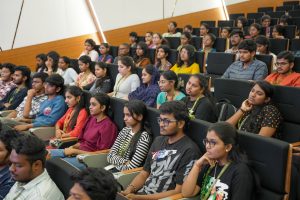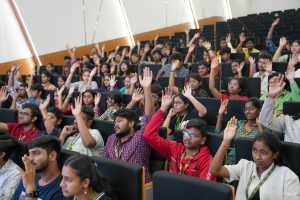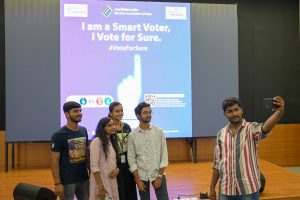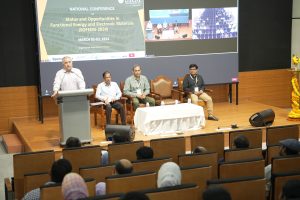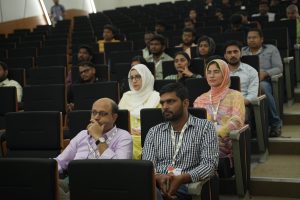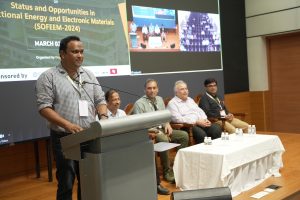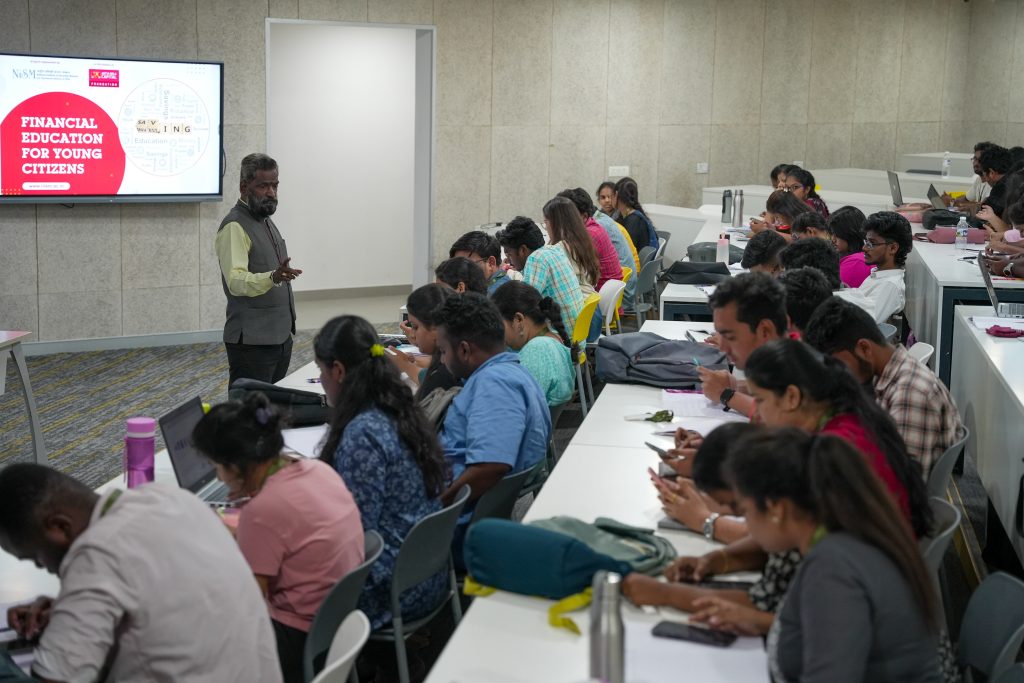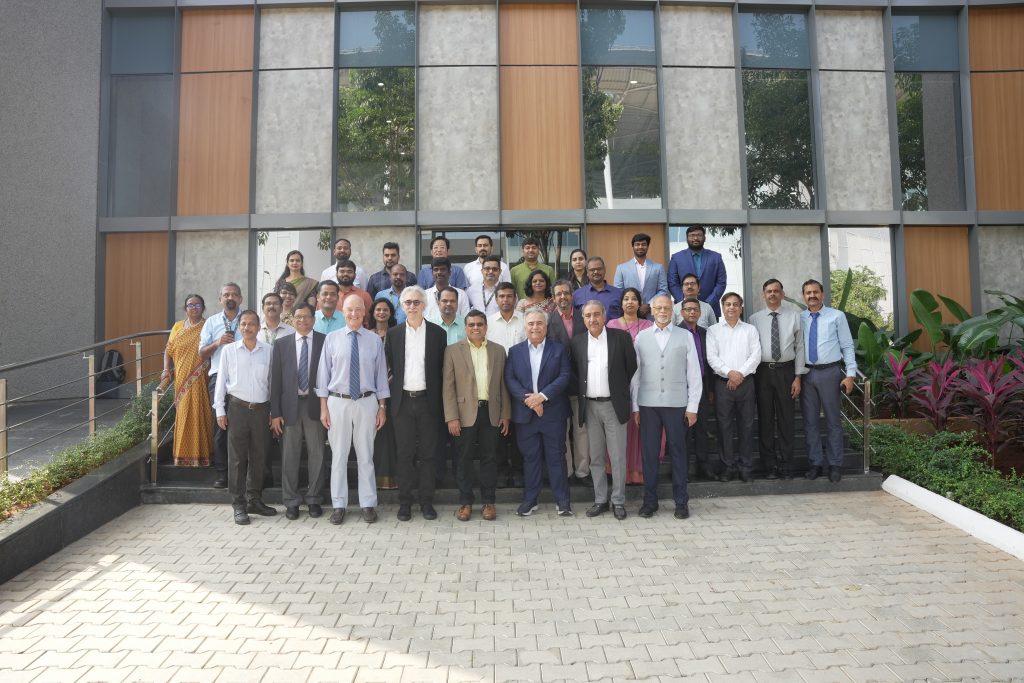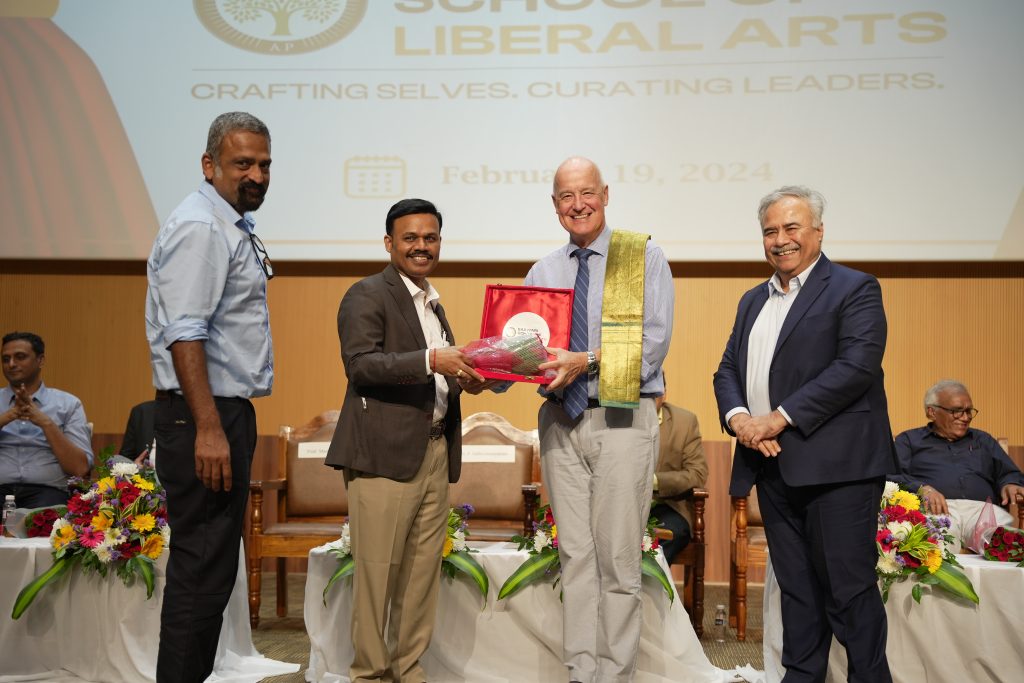Deep Transfer Learning for Green Environment Security in Smart Cities
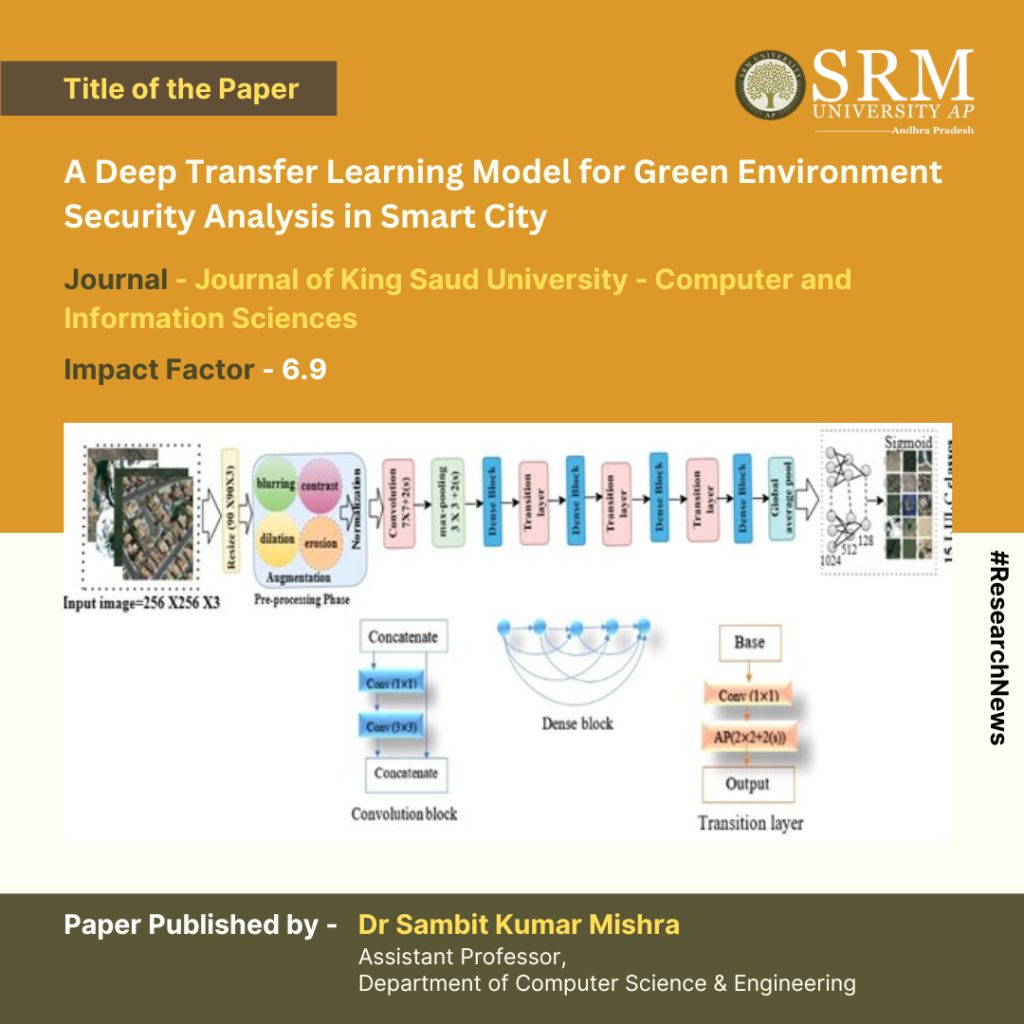
The Department of Computer Science and Engineering is pleased to announce an extraordinary research paper titled “A Deep Transfer Learning Model for Green Environment Security Analysis in Smart City“, authored by Dr Sambit Kumar Mishra, Assistant Professor, was published in the Journal of King Saud University – Computer and Information Sciences that falls within the Q1 quartile with an Impact Factor (IF) of 6.9. The study introduces a model to automatically classify high-resolution scene images for environmental conservation in smart cities. By enhancing the training dataset with spatial patterns, the model improves green resource management and personalised services. It also demonstrates the effectiveness of LULC classification in smart city environments using transfer learning. Data augmentation techniques improve model performance, and optimisation methods enhance efficiency, contributing to better environmental management.
Abstract
The research addresses the importance of green environmental security in smart cities and proposes a morphologically augmented fine-tuned DenseNet121 (MAFDN) model for Land Use and Land Cover (LULC) classification. This model aims to automate the categorisation of high spatial resolution scene images to facilitate green resource management and personalised services.
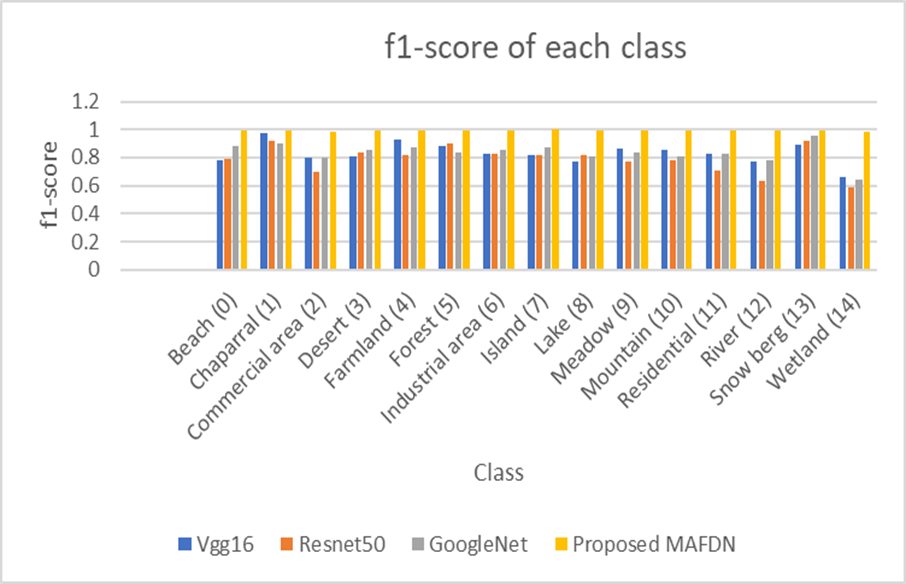
Dr Mishra collaborated with Dr Rasmita Dash and Madhusmita Sahu from SoA Deemed to be University, India, as well as Mamoona Humayun, Majed Alfayad, and Mohammed Assiri from universities in Saudi Arabia.
His plans include optimising the model using pruning methods to create lightweight scene classification models for resolving challenges in LULC datasets.
- Published in CSE NEWS, Departmental News, News
Tracing a Translator’s Journey: An Interview with V Ramaswamy
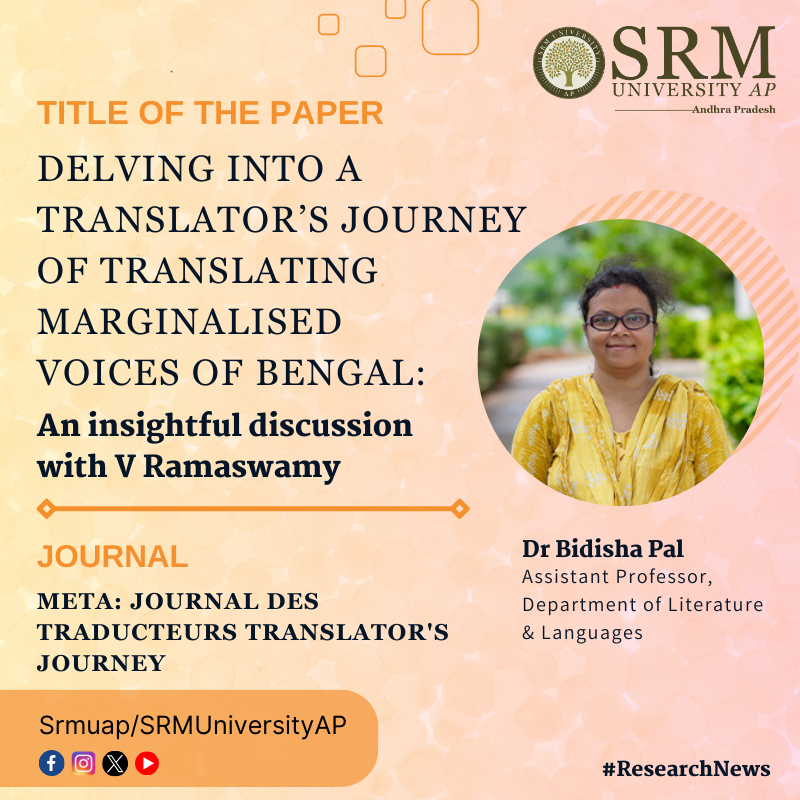
A translated work must retain the essence and flavour of regional culture and locales. A good translator tries to reproduce the particularities that are ingrained within the texts. On this note, Dr Bidisha Pal, Assistant Professor from the Department of Literature and Languages, has published a paper, “Delving into a Translator’s Journey of Translating Marginalised Voices of Bengal: An Insightful Discussion with V Ramaswamy” in Meta Journal des traducteurs Translators’ Journal. This research revolves around a discussion with the well-known translator V Ramaswamy, a noted name in Bengali Dalit literature and translation. Ramaswamy shares his thoughts on working on the translation projects that he enjoys doing and that establish the cause of the marginalised people of Bengal.
Abstract
In this interview discussion with Bidisha Pal and Md. Mojibur Rahman, translator V Ramaswamy focuses on the journey of his translation and tryst with the marginalised Dalit voice(s) in Bengal. He speaks about the writings that propel him to choose translating and to carry voice(s) beyond the Bengal arena, thus dissolving language barriers. The deliberate choice to translate various pieces representing various periods acts as a witness to his existence as an independent translator. According to him, translation is also a source of healing to deal with a tragic past and the complicacies that life often presents to him. He shares his experience translating Subimal Mishra, the powerful poet who speaks for marginalised people. Ramaswamy, as he states in the interview, makes a vow to translate Mishra’s whole writing career. He talks about translating Manoranjan Byapari, a Bengali Dalit prize-winning author and political persona who has also championed the Dalit cause in Bengal, Adhir Biswas, the story-writer and publisher of a publishing house in Kolkata Gangchil that publishes writings by those literary personas who do not fall, as such, into the category of the mainstream, Bangladeshi writer Shahidul Zahir whose revolutionary voice and zeal reverberate in the literary world of Bangladesh, as well as Ansaruddin, a writer and farmer by profession whose works Ramaswamy is currently translating. Despite not being a part of the literary world, Ramaswamy has built an intense connection with literature and has gradually become part of the world. For him, translation is something that has to remain faithful to the source text, especially if people are doing literary translation.
Practical implementation/social implications of the research
The research contains elements that are connected with the values of the society. It discusses the nuances of translation of the writings of marginalised people, which contain many unforeseen truths of society, and depicts the struggles for the existence of the people. The translator is doing a commendable job compiling the writing thorough translation that will act as a bridge to the unfamiliar audience who could feel connected with the marginalised people.
Dr Bidisha aims to publish many more articles in the diverse interdisciplinary fields of literature, edit books, and attend conferences.
- Published in Departmental News, English Current Happenings, English news, News, Research News
Igniting the Flame of Democracy: ‘Mera Pahala Vote Desh ke Liye’ Initiative
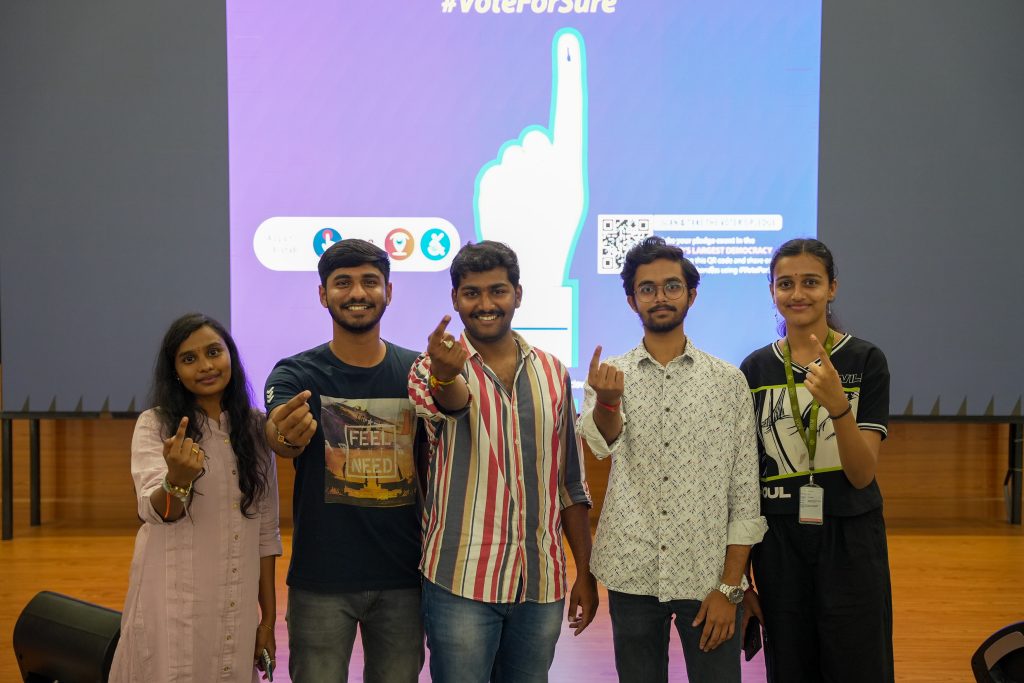
The campus of SRM University-AP was abuzz with a palpable energy as the Directorate of Student Affairs hosted the electrifying “Mera Pahala Vote Desh ke Liye” (My First Vote for the Nation) initiative on March 07, 2024. In a powerful display of civic engagement, students rallied together to celebrate the essence of democracy and ignite the flame of active citizenship.
The event kicked off with a captivating video screening that transported attendees on a journey through India’s vibrant democratic tapestry. Stories of ordinary citizens whose votes reshaped destinies unfolded before their eyes, reminding them of the transformative power they wield with a single mark on the ballot.
As the last frame faded, a solemn hush fell upon the gathering, and a collective pledge echoed through the halls. Students’ voices, united in purpose, vowed to exercise their constitutional rights and make their voices heard in the democratic process. The atmosphere crackled with determination and a renewed sense of responsibility.
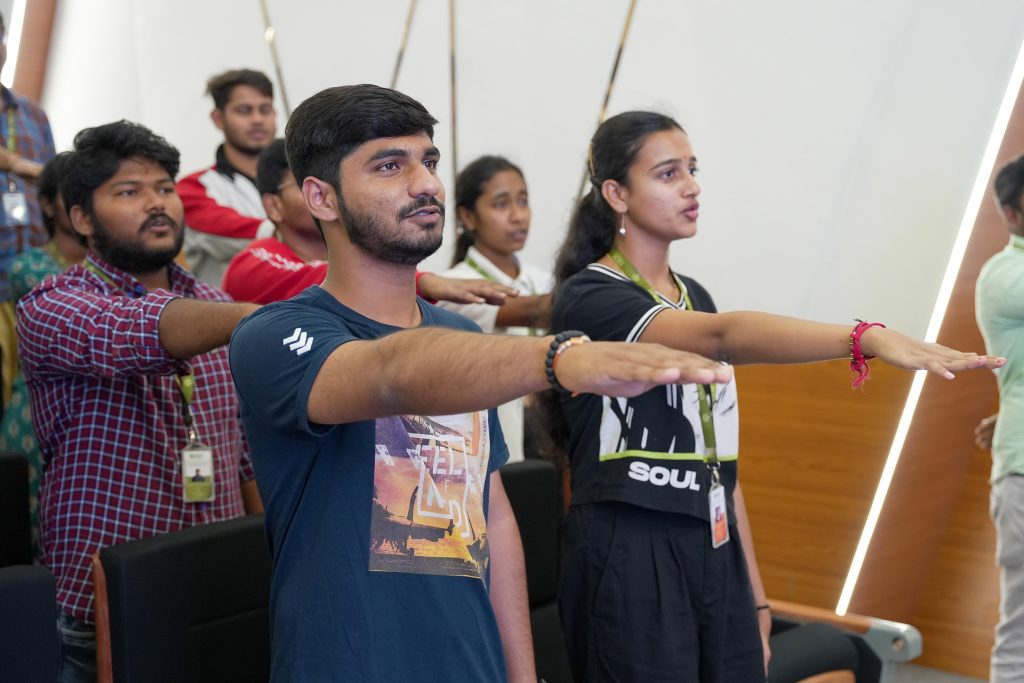
But the celebration didn’t stop there! In a burst of youthful enthusiasm, a dedicated selfie point sprung to life, capturing the infectious energy of the moment. Students eagerly posed, their smiles radiating pride and purpose as they immortalised their commitment to shaping the nation’s future.
SRM University-AP‘s commitment to nurturing responsible citizens was displayed as the institution partnered with the Election Commission of India to kindle the flame of democratic participation. With each selfie shared and pledge taken, a powerful message resounded: the future belongs to those actively shaping it.
As the event drew to a close, the campus hummed with a renewed sense of purpose, a collective awakening to the responsibilities and privileges of being citizens of the world’s largest democracy. The ‘Mera Pahala Vote Desh ke Liye’ initiative has undoubtedly left an indelible mark, igniting a fire within the hearts and minds of SRMites – a fire that will guide them as they navigate the intricate tapestry of India’s democratic journey.
- Published in News, student affairs news, Students Affairs Events
SOFEEM-2024: A National Conference on Functional Energy and Electronic Materials
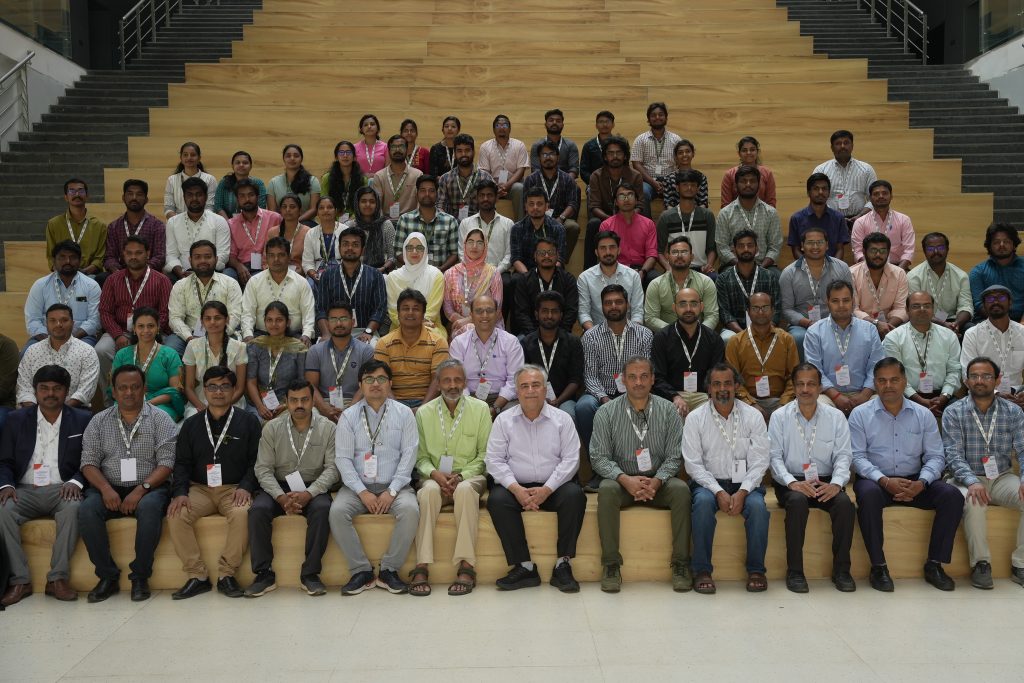
SRM University-AP hosted a national conference on “Status and Opportunities in Functional Energy and Electronic Materials” (SOFEEM-2024) on March 02-03, 2024. The conference was organised by the Department of Physics and was supported by the Department of Science and Technology, Government of India. The conference brought together about 100 participants from various reputed institutions, national laboratories, and universities from India. They shared their research outcomes and discussed the various frontier energy technologies and smart electronic devices.
The main theme of the conference was to boost the development and optimal use of renewable energy and to promote sustainable energy and intelligent electronics. The conference focused on fostering collaboration among researchers and practitioners to explore cutting-edge developments in these domains and pave the way for innovative solutions. A diverse array of topics was covered, including:
- Synthesis and processing of novel energy and electronic materials
- Modelling of low-dimensional materials
- Materials and catalysts for green hydrogen production
- Electrolyte and electrode materials for high-performance batteries and fuel cells
- Functional materials for supercapacitors
- Device fabrication using novel energy materials for energy conversion and storage
- Low-dimensional materials in electronics and photonics
The conference was inaugurated by Prof. Manoj K Arora, Vice Chancellor, who welcomed the guests and the delegates and highlighted the university’s achievements and vision. He also emphasised the importance of interdisciplinary research and innovation in addressing the global energy and environment challenges.
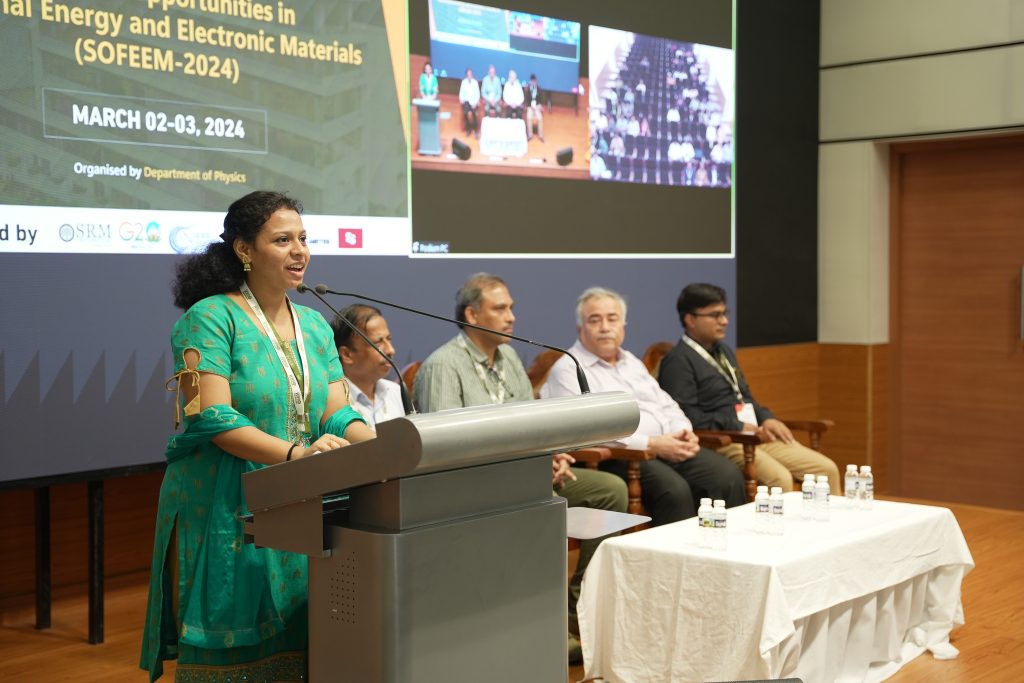
The conference featured keynote lectures, invited talks, oral presentations, and poster sessions by experts and young researchers. Distinguished Keynote speakers from IIT Madras, along with Invited speakers from prestigious institutions such as the Indian Institute of Science (IISC) Bangalore, IIT Tirupati, IIT Hyderabad, University of Hyderabad, IISER Bhopal, and the CSIR – Central Electrochemical Research Institute (CECRI) in Tamil Nadu, among others from esteemed state universities, shared their groundbreaking research. The conference provided a good platform for the participants to interact with the eminent researchers to enrich and share their knowledge in their respective fields of research and engage in potential collaboration to develop innovative technologies in the areas of sustainable energy, advances in materials research and computational sciences. In addition, research scholars from nearby universities (such as VIT-AP, Vignan University, Acharya Nagarjuna University, and SRM-IST) participated in the conference and showcased their current research works.
The conference concluded with awards for the best poster and oral presentation by research scholars, celebrating their significant contributions to the field. The conference concluded with a valedictory session, where the best oral and poster presentations were awarded, and feedback from the participants was collected. The conference was well-received by the attendees, who appreciated the quality and diversity of the scientific discussions, as well as the university’s hospitality and facilities.
- Published in Departmental News, News, Physics News
A Pathbreaking Cross Between Medicine and Technology
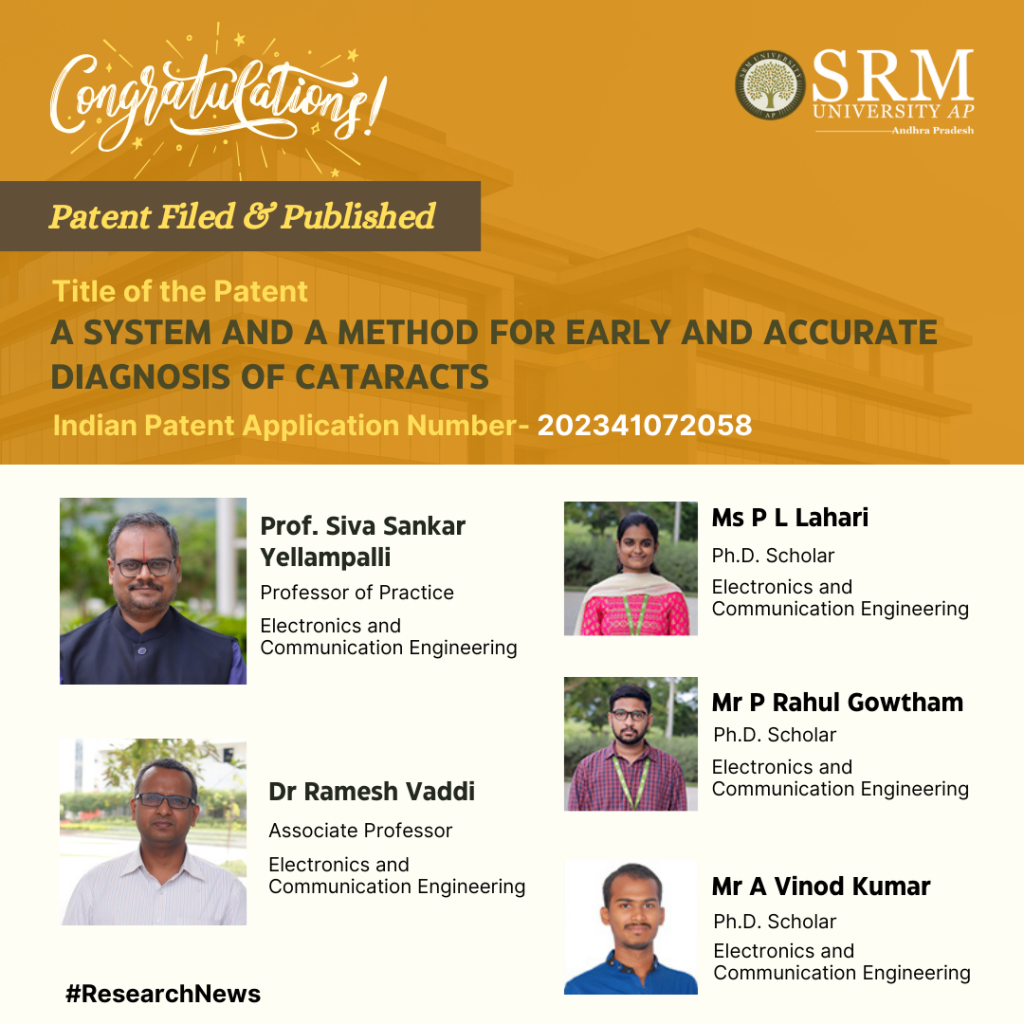
The advent of scientific research and technologies in the domain of medicine has recently taken limelight due to its immense benefit on humankind and the medical community. The expert faculty and scholars have recently published a patent, “A System and a Method for Early and Accurate Diagnosis of Cataracts” with Application no.: 202341072058 has put forth an engaging invention on utilising technology for early cataract recognition. Hearty congratulations to Prof. Siva Sankar Yellampalli, Professor, Dr Ramesh Vaddi, Associate Professor, and their Ph.D. Scholars Ms P L Lahari, Mr P Rahul Gowtham, and Mr A Vinod Kumar from the Department of Electronics and Communication Engineering for this groundbreaking achievement!
Abstract
Cataracts are a common eye condition in which the lens of the eye gets clouded, impairing vision. Early cataract detection is crucial for prompt treatment and vision preservation. We have classification and prediction algorithms like VGG, ResNet, DenseNet, Xception, Inception, and other object detection techniques like Yolo, Fast R-CNN, and SSD. Various pre-trained models are employed for cataract categorisation and prediction. Several attempts to detect cataracts have been made, but none have proven effective. A clinical examination by eye specialists is used to diagnose cataracts. An edge board can be used instead of a clinical examination to diagnose cataracts.
We created a method for real-time cataract recognition using the present pre-trained weights of the object detection model YoLoV5. We employ pre-trained YoLo V5 weights for model training, testing, and validation. Connect the Jetson Nano board and Lenovo HD USB camera to the CPU, which serves as the CPU. The monitor is used for programming, and the output is presented on the monitor owing to the board communicating with the camera. The result shows the image with an eye labelling box that tells if the eye is normal or cataract.
- Published in Departmental News, ECE NEWS, News, Research News
Young Investors Workshop for Management Graduates
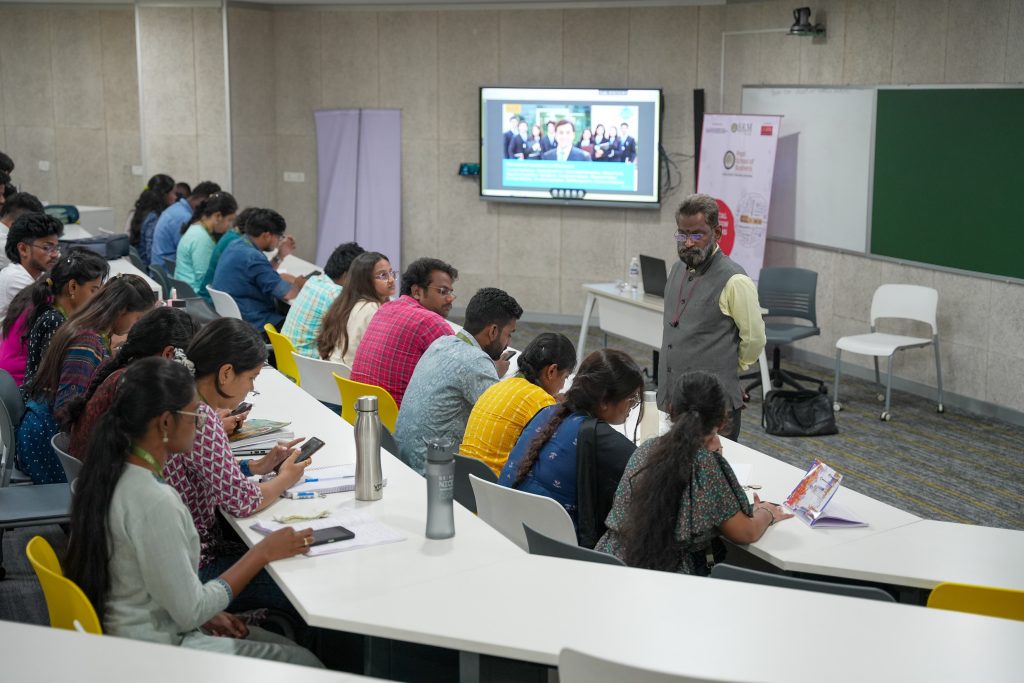
The Paari School of Business has organised a transformative two-day Young Investor Education Workshop on “Financial Education for Young Citizens” for MBA students on February 26-27, 2024, led by finance expert Dr Vijaya Kumar Chilukuri from NISM. The sessions covered diverse finance intricacies and career strategies. Certificates were awarded to participants who cleared the examination, adding value to their academic journey. A Pre-assessment and post-assessment were conducted, which helped students understand their learning journey. Dr Chilukuri’s expertise and his interactive sessions left a lasting impact on all the students, and they actively participated in learning many key concepts of savings and investments. These workshops conducted by the school align with SRM AP’s commitment to holistic education and student success.
- Published in Departmental News, News, Paari Current Happenings, paari-events
Pioneering the Future: Ultrafine MgAl2O4 Particle-Stabilised Mg-3Ca Alloy Foams
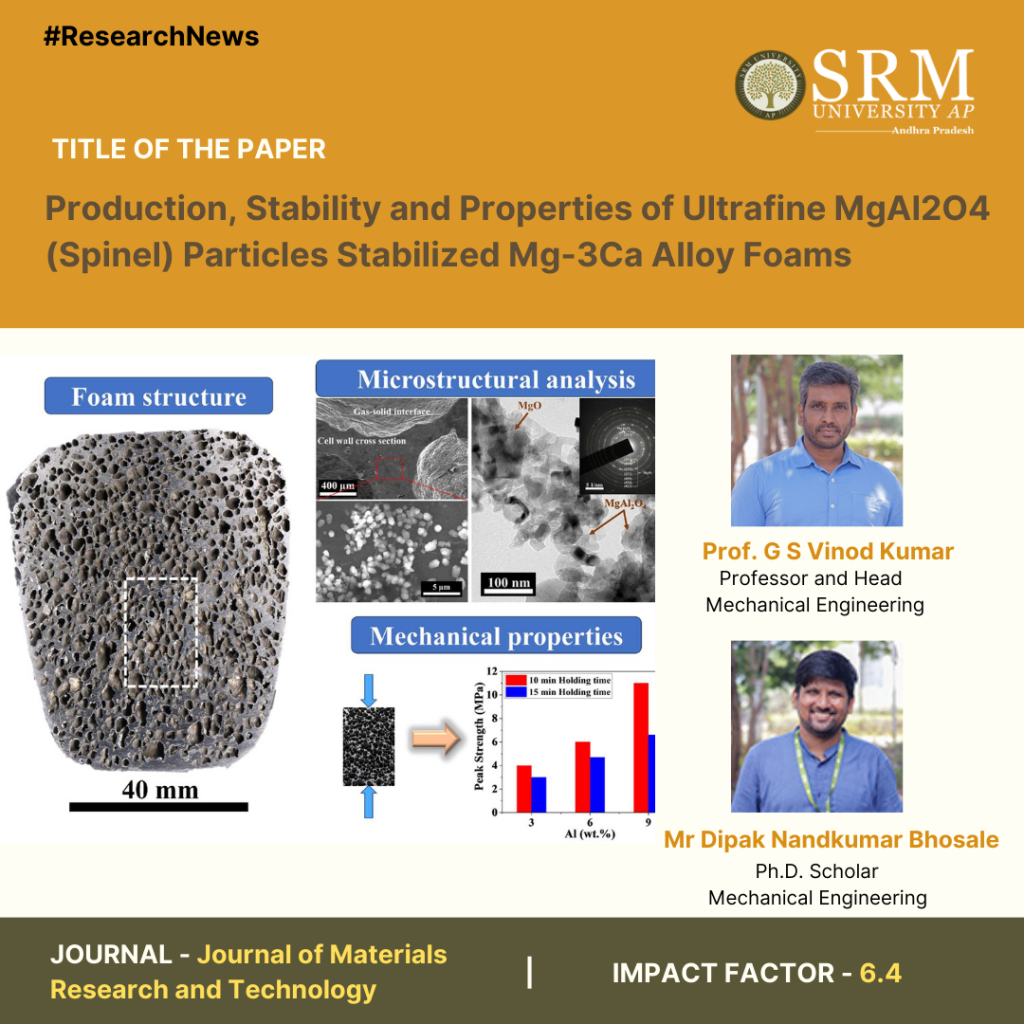
The Department of Mechanical Engineering is thrilled to announce a significant breakthrough in materials science has been achieved through the diligent research efforts of Prof. G S Vinod Kumar, Professor and Head of the Department and his Ph.D. scholar, Mr Dipak Bhosale in their latest paper, “Production, stability and properties of ultrafine MgAl2O4 (Spinel) particles stabilized Mg-3Ca alloy foams”. The study focuses on the development and detailed analysis of Mg–3Ca alloy foams, uniquely enhanced by ultrafine MgAl2O4 (spinel) particles. This innovative research outlines a novel methodology for improving the mechanical properties of magnesium foams, providing unparalleled advantages for a multitude of industrial applications.
Abstract
The present work reports the synthesis and mechanical behaviour studies of Mg–3Ca alloy foams stabilized by ultrafine MgAl 2 O 4 (spinel) particles. The MgAl 2 O 4 particles were created in-situ in the Mg–3Ca alloy melt through the reaction of Mg, Al and O. Foaming was done by adding dolomite (CaMg(CO 3 ) 2 ) as a blowing agent in the melt. The foaming behaviour was studied for different MgAl 2 O 4 content in Mg–3Ca and holding times (10 and 15 min). The study reveals that the presence of MgAl 2 O 4 significantly influences the foaming behaviour of Mg–3Ca alloy resulting in equiaxed cell structure, uniform cell size distribution, and higher expansion in comparison to the Mg–3Ca alloy foam, which contains only MgO and CaO. An in-depth phase and microstructural analysis were performed to investigate the particles present in the gas-solid interface of the foam that contribute to foam stabilization. The quasi-static compression studies of foams exhibited better compressive strength (≈3–11 MPa) and energy absorption capacity (≈1.3–5.7 MJ/m3) in comparison to the Mg foams reported in the literature. The ductility of the Mg foams was also measured and compared with that of existing aluminium foams.

Research Highlights:-
- Innovative Synthesis: The MgAl2O4 particles are synthesized in situ within the Mg–3Ca alloy melt via a controlled reaction involving Mg, Al, and O. This process ensures the uniform dispersion of spinel particles, which is critical for the foam’s structural integrity and performance.
- Foaming Process: By employing dolomite (CaMg(CO3)2) as a blowing agent, the research team meticulously explored the foaming behaviour under various MgAl2O4 contents and holding times (10 and 15 min). The findings highlight a marked improvement in foam expansion and stability.
- Structural and Mechanical Analysis: Through comprehensive phase and microstructural analyses, the pivotal role of MgAl2O4 particles at the gas-solid interface in stabilizing the foam structure was uncovered. Quasi-static compression tests revealed outstanding compressive strength (≈3–11 MPa) and energy absorption capacity (≈1.3–5.7 MJ/m3), surpassing existing benchmarks for magnesium foams.
Key Properties and Applications:-
- Low Density & High Strength-to-Weight Ratio: The Mg–3Ca alloy foams showcase an optimal balance of low density and high mechanical strength, rendering them ideal for lightweight structural applications.
- Enhanced Energy Absorption: Their unique cellular structure provides superior energy absorption capabilities, suitable for impact and crash-resistant applications.
- Biocompatibility: Owing to magnesium’s biocompatibility, these foams are highly promising for biomedical applications, including bone implants and scaffolds for tissue engineering.
- Thermal Conductivity & Corrosion Resistance: Additionally, these foams exhibit advantageous thermal and corrosion-resistant properties, broadening their applicability across various environmental conditions.
Transformative Impact Across Industries:-
- Aerospace and Automotive: The significant weight reduction capabilities, coupled with uncompromised strength, position the Mg–3Ca alloy foams as revolutionary materials for component design in the aerospace and automotive sectors.
- Biomedical: Their biocompatible nature and structural characteristics make these foams an excellent option for medical implants and scaffolds, poised to improve patient outcomes in orthopaedics and tissue engineering significantly.
- Energy and Beyond: From thermal management solutions in renewable energy systems to applications in sports equipment, the potential uses for these magnesium foams are extensive and diverse, heralding a new chapter in material science.
This groundbreaking research not only advances the field of magnesium foam technology but also paves the way for new possibilities in lightweight, high-performance materials across various industries. The team is dedicated to further exploring the capabilities of these innovative materials and eagerly anticipates partnering with industry stakeholders to transition these advancements from the laboratory to commercial applications.
- Published in Departmental News, Mechanical Engineering NEWS, News, Research News
Invited as Chief Guest at Tech Symposium
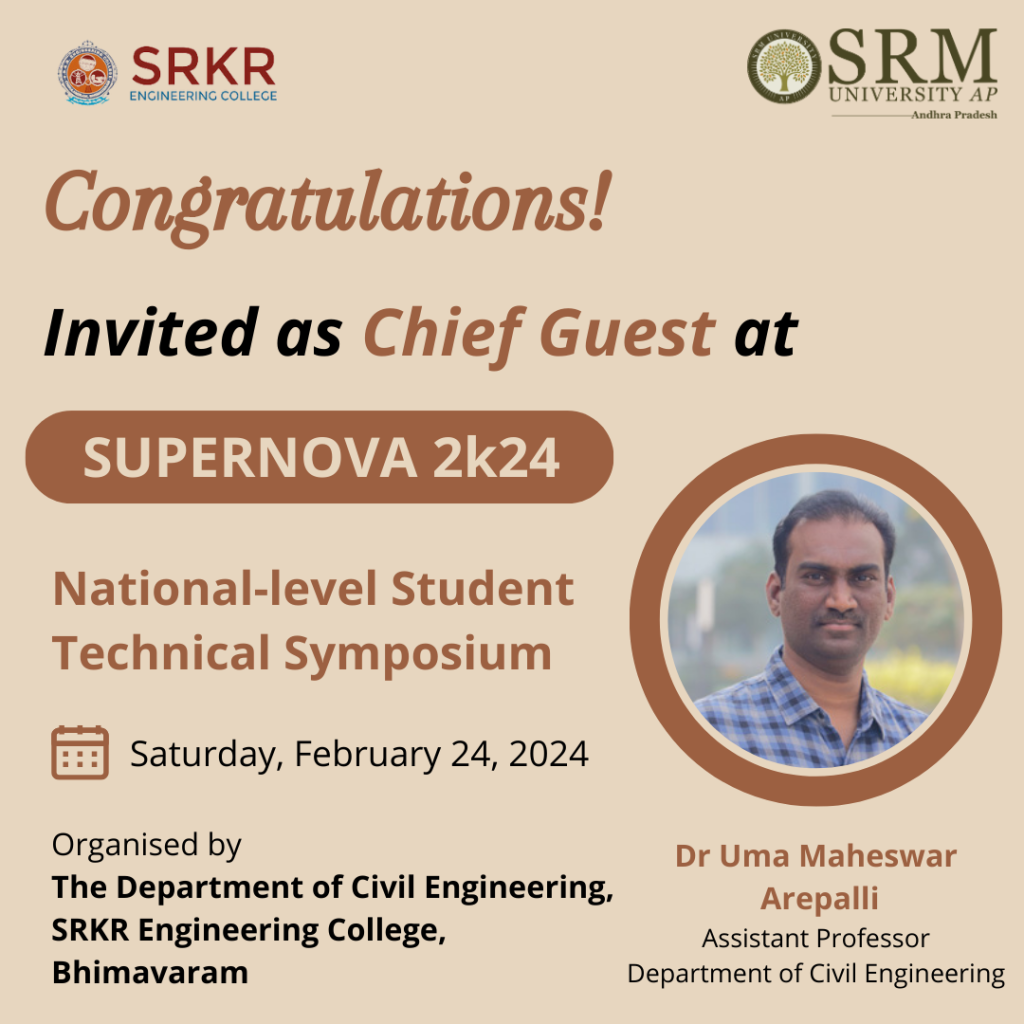
Dr Uma Maheswar Arepalli, Assistant Professor in the Department of Civil Engineering, has been invited as the esteemed Chief Guest at SUPERNOVA-2k24, a prestigious National Level Student Technical Symposium organised by SRKR Engineering College, Bhimavaram on February 24, 2024.
This is a well-deserved feather in the cap for Dr Arepalli, whose expertise in the field of civil engineering knows no bounds. Dr Arepalli will also deliver an expert lecture inspiring enthusiastic students to become young engineers!
Here’s to many more accolades coming your way, Dr Arepalli! From shaping young minds to pushing the boundaries of innovation, he’s a true trailblazer!
- Published in CIVIL NEWS, Departmental News, News
Shaping an Academic Scholarly Milieu: Grand Launch of Easwari School of Liberal Arts
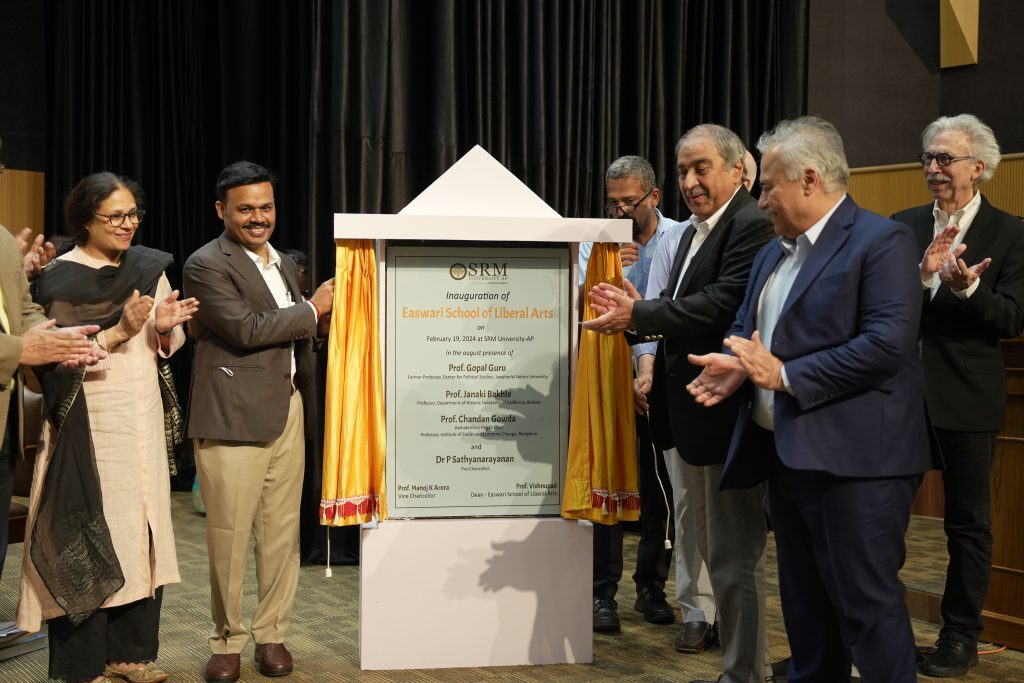
SRM University-AP relaunched the School of Liberal Arts and Social Sciences as the Easwari School of Liberal Arts, establishing a new era of transformative learning and research to address the complexities of human society. The school was inaugurated in the august presence of Pro-Chancellor Dr P Sathyanarayanan; Vice Chancellor Prof. Manoj K Arora; Members of the Governing Body – Prof. Pradeep Khosla, Chancellor, University of California, San Diego, Prof. Nicholas B Dirks, Emeritus Chancellor, University of California, Berkeley, Prof. Prasant Mohapatra, Vice Chancellor for Research and Provost and Vice President for Academic Affairs, University of South Florida, and Prof. Andrew D Hamilton, President, New York University; Dean – Easwari School of Liberal Arts, Prof. Vishnupad; Deans and Directors of various departments and faculty, staff and students of the university. Prof. Gopal Guru, Former Professor, Center for Political Studies, JNU; Prof. Janaki Bakhle, Associate Professor at the University of California, Berkeley; and Prof. Chandan Gowda, Ramakrishna Hegde Chair Professor, Institute of Social and Economic Change, Bengaluru, graced the momentous occasion as Guests of Honour.
The rechristened Easwari School of Liberal Arts aims to propel students’ intellectual, emotional and ethical growth, equipping them to become future knowledge creators. “The launch of Easwari School of Liberal Arts is a testament to the university’s commitment to interdisciplinary learning and research. Through a sound liberal arts education, we aim to cultivate diversified skills among our students,” remarked Vice Chancellor Prof. Manoj K Arora in his address. Prof. Vishnupad, Dean – Easwari School of Liberal Arts, further expounded on the symbolic renaming of the school and its established imperative to foster a three-fold growth in students – emotional, ethical and intellectual.
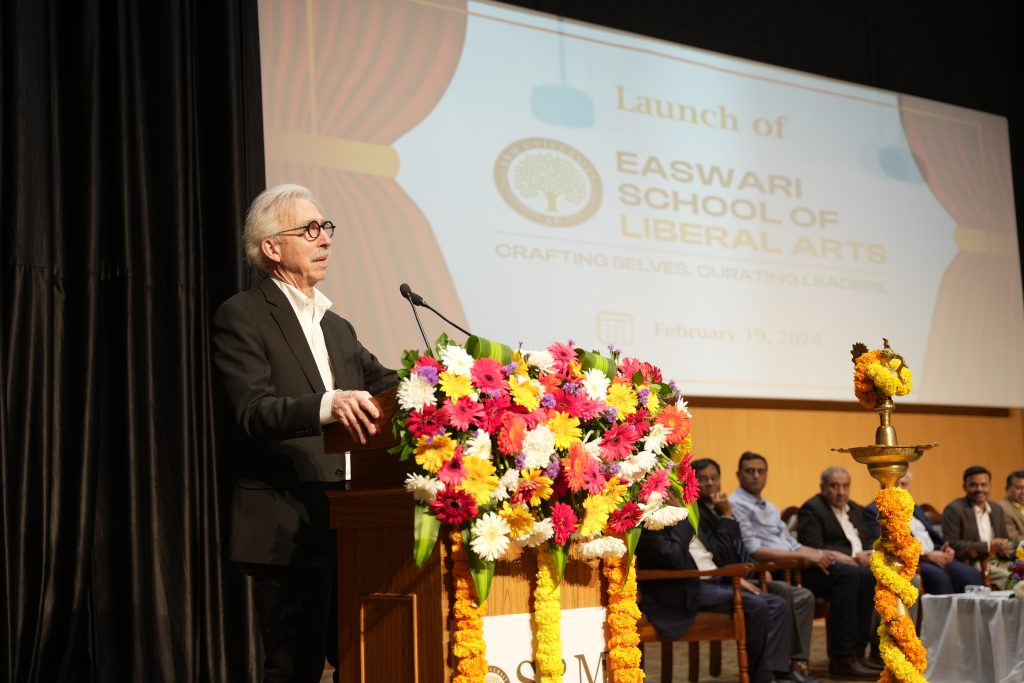
Pro-Chancellor, Dr P Sathyanarayanan commented that Easwari School of Liberal Arts opens the doorway to a brave new world of learning that will forge visionary thinkers. The School advocates breaking the academic silos of disciplines and offering students a more comprehensive integrated learning experience. In his address, Prof. Nicholas Dirks, Honourary Pro-Chancellor and a Governing Body member of SRM AP, stated, “Liberal Arts is a constitutive element of comprehensive education. SRM University-AP, with the launch of a dedicated School of Liberal Arts, is on its path to develop into an excellent comprehensive institute of higher education.”
The grand launch also witnessed a keynote speech by Guest of Honour, Prof. Gopal Guru, on the significance of liberal arts education in comprehending, analysing and solving the complexities of postmodern society. Insightful and inspiring book discussions on the books “Savarkar and the Making of Hindutva”, authored by Prof. Janaki Bakhle and “Another India: Events, Memories, People”, by Prof. Chandan Gowda, offering critical insights into the raw sentimentality of Indian society were highlights of the event.
The Easwari School of Liberal Arts harbours a robust, socially relevant, innovative curriculum, a distinguished and committed faculty, and imaginative and engaged teaching and learning methods to cultivate a class of motivated student ambassadors of tomorrow. In addition to offering traditional programmes such as B.A/B.Sc.(Hons.) in English, Economics, History, Psychology and B.Com in International Accounting; the School has also launched three pioneering programmes, namely, B.A. (Hons.) in Politics, Media Studies and Sociology and Anthropology, to equip students on how to address the socio-political, cultural and economic outlook of today’s society. With a novel pedagogy, these innovative programmes nurture logical reasoning, dynamic perspectives, rigour in thought and ideas, and critical reflection among students.
- Published in News, SLASS, University Event
Rethinking Ionic Liquids as an Environment-friendly Solvent
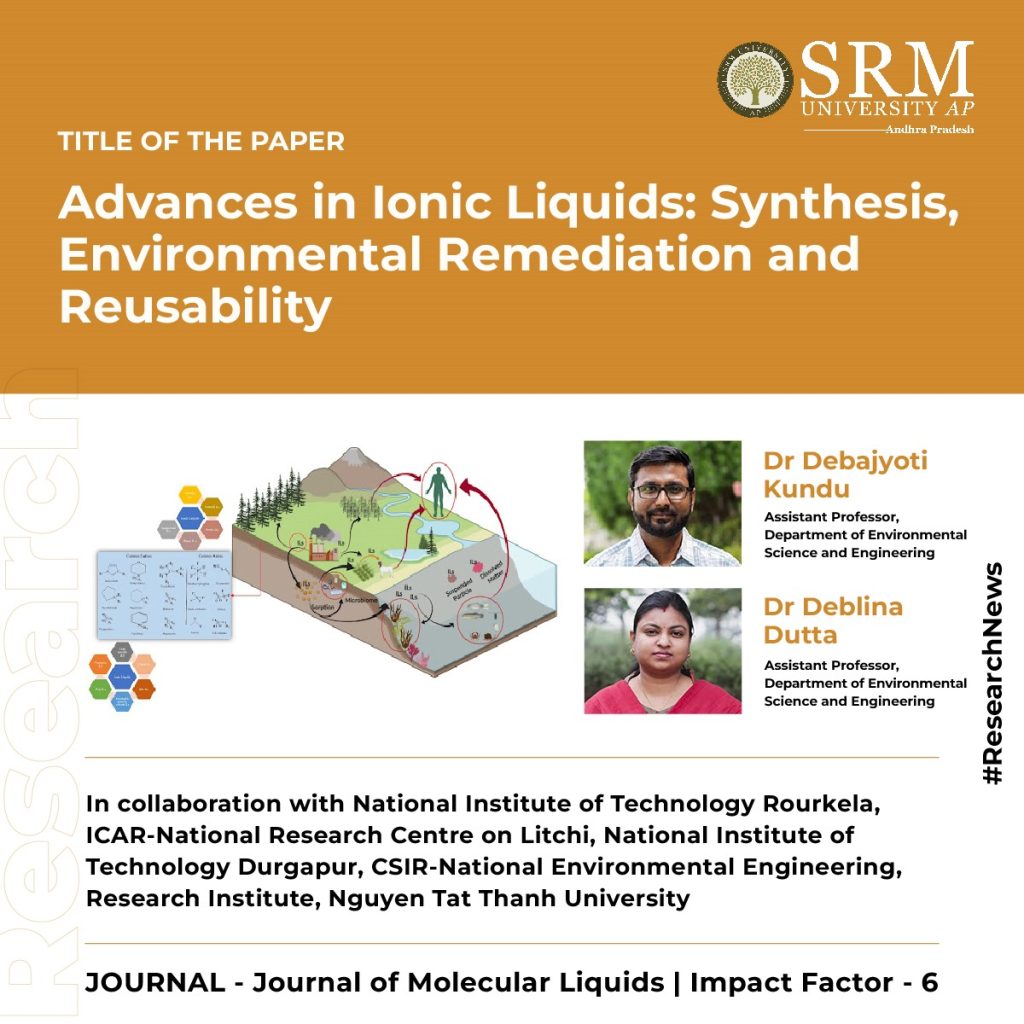
Dr Debajyoti Kundu and Dr Deblina Dutta, Assistant Professors, Department of Environmental Science and Engineering, have conducted seminal research on Ionic Liquids (ILs) in their paper “Advances in ionic liquids: Synthesis, environmental remediation and reusability” published in the Q1 journal, Journal of Molecular Liquids with an impact factor of 6. In the research article, the faculty duo have delved into the unique properties of ionic liquids, focusing on their role in environmental cleanup and showcasing their ability to combat pollutants. Various methods to recycle and reuse ILs, develop eco-friendly ILs, and scale up their application for effective environmental remediation have also been extensively explored.
Abstract
Ionic liquids (ILs) are next-generation solvents synthesised by organic salts, possessing negligible vapour pressure and low flammability. They possess high thermal and electrochemical stability, can be reused for multiple cycles, and their properties can be tuned according to the components used in their synthesis. Hence, ILs are considered to be potential alternatives for conventional organic solvents for numerous applications such as environmental remediation, nanoparticle synthesis, catalysts in various chemical reactions, solvents for the extraction of biomolecules from recalcitrant lignocellulosic biomass, etc. In this review article, the holistic approach of ILs, starting from various techniques adopted for their synthesis along with its critical review, is discussed, followed by a detailed discussion of the mechanism involved in the remediation of environmental pollutants using ILs. Further, in-depth documentation of various environmental pollutants remediated using ILs has been done to date. One of the major drawbacks of solvent application is the reusability factor, and hence, in this review article, techniques adopted to recycle/reuse ILs have been discussed. Further, the adverse effects of using ILs for environmental remediation have been comprehensively discussed to present a holistic view. Future studies should focus on synthesising environment-friendly ILs and their field-scale applications for environmental remediation.
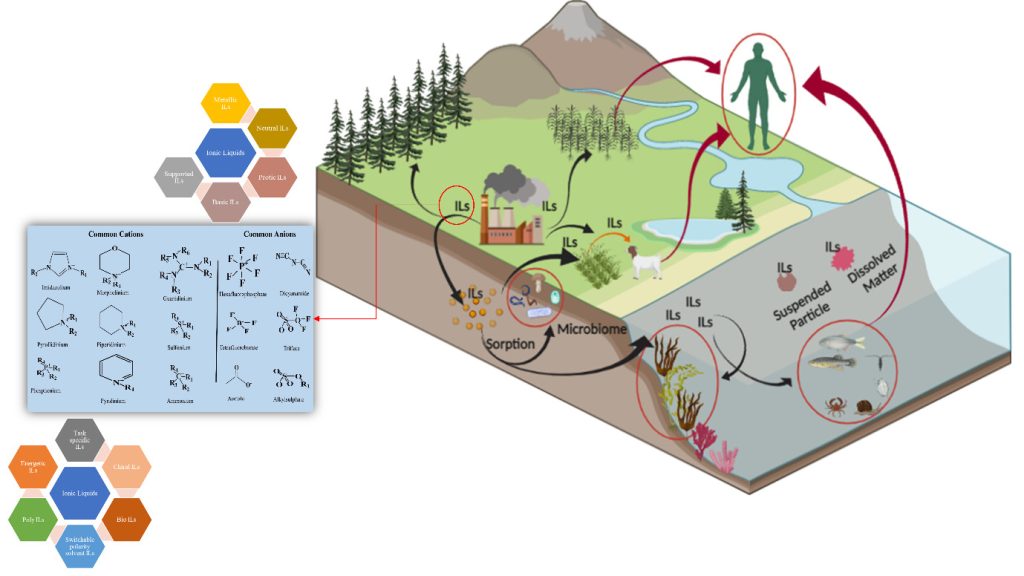
Practical implementation/social implications of the research
Their research on Ionic Liquids (ILs) presents a transformative approach to environmental challenges. By applying ILs on a larger scale for cleaning polluted air and water, promoting recycling and reusability, and developing eco-friendly ILs, the work has direct implications for industries and communities. The adoption of IL-based technologies contributes to efficient environmental cleanup and aligns with the growing societal demand for sustainable practices. Successful field-scale applications and public awareness initiatives can lead to a cleaner and healthier environment, demonstrating the tangible benefits of incorporating ILs into real-world solutions and fostering a more responsible and eco-conscious society.
Collaborations:-
- National Institute of Technology Rourkela
- ICAR-National Research Centre on Litchi
- National Institute of Technology Durgapur
- CSIR-National Environmental Engineering Research Institute
- Nguyen Tat Thanh University
Dr Kundu and Dr Dutta remarks that their future research in the realm of Ionic Liquids (ILs) will prioritise the development of environmentally sustainable synthesis methods, rigorous assessments of biodegradability and toxicity, and integrating ILs into industrial processes. Scaling up studies to evaluate their effectiveness in large-scale environmental remediation, investigating public perceptions, and fostering multidisciplinary collaborations with experts from diverse fields will be crucial for the responsible adoption of IL-based technologies. Additionally, focusing on life cycle assessments, exploration of novel applications, policy recommendations, and educational outreach can collectively contribute to advancing the understanding and practical implementation of ILs, ensuring a holistic and impactful approach to their environmental applications.
Click to read the article!
- Published in Departmental News, ENVS News, News, Research News


